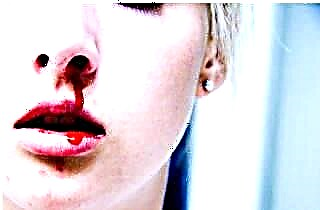The occurrence of bleeding is always alarming. Especially when it comes to the respiratory organs. In a single bronchopulmonary system, the nose is the first to take on an unfavorable external influence and react to it. If nosebleeds appear at night, a thorough analysis of the situation and the state of health in general is needed. It is also important not to get confused and take the right measures to prevent a lot of blood loss.
Suspected causes of bleeding
The cause of bleeding is often involuntary scratching of the nasal mucosa during sleep. The rest of the reasons are less harmless and are associated, as a rule, with a violation of the strength of the vascular walls. So, during sleep, nosebleeds are possible for several reasons:
 destruction of the walls of blood vessels;
destruction of the walls of blood vessels;- increased permeability of vascular tissues;
- changes in blood composition;
- tumor;
- high blood pressure;
- rapid change in atmospheric pressure;
- overheat;
- physical stress;
- pregnancy.
If a nosebleed unexpectedly at night, the reason usually lies in the fragility of the vessels of the nasal septum, so it is enough to scratch the nose hard enough to show unwanted discharge. During a cold, when the nose is stuffed up, drops of blood may also appear with careless and rough cleansing. In such situations, the discharge is in the form of drops or a thin stream. With good clotting, the blood quickly stops, no threat to health arises. To stop bleeding, sometimes it is enough to sit and straighten, and apply cold to the problem area.
Heavy and profuse bleeding usually indicates damage to large vessels located in the upper and posterior parts of the nasal cavity. Injuries to large vessels are indicated by the color of the discharge: they are of a bright red hue. If the nose bleeds at night and cannot be relieved, it is fatal. It should be noted that if large vessels are damaged, the bleeding may not stop on its own, so the prognosis depends on the timely assistance provided.
Blood can flow from the nose at night due to bouts of hypertension, when the walls of blood vessels are under high pressure. The influence of this cause is confirmed by other signs: severe headache, tinnitus, dizziness.
Such symptoms are equally possible in both an adult and a child, and in adolescents they are often observed during the period of hormonal changes. Influenced by infections, the course of diseases of the throat or nose, the use of certain drugs to relieve inflammation and vasoconstriction.
Night sleep can also be interrupted due to a more serious reason - the development of a tumor. The development of neoplasms of any nature adversely affects blood clotting and the strength of the vascular walls.
Frequent cases of bleeding are also caused by diseases of the hematopoietic system and joints, diabetes mellitus, chronic liver disease.
How to act in an alarming situation?
It is important not to fuss unnecessarily, since ill-considered actions can harm the patient. It should be remembered that:
 you can't go to bed;
you can't go to bed;- do not throw your head up;
- you need to sit up straight and slightly tilt your head forward;
- with your fingers it is necessary to squeeze the nostrils on both sides and not let go for 8-10 minutes;
- if a person has lost consciousness, they should be turned to the side so that the discharge does not flow into the lungs, and urgently taken to the hospital.
Doctors warn that trying to stop the bleeding by tilting the head back is pointless, since in this case the blood goes down the throat. This leads to severe coughing and vomiting, increased bleeding.
A cold compress helps to calm the blood. You can use a cloth soaked in cold water or ice cubes wrapped in cotton. Ice should not come into direct contact with the skin. The duration of such a procedure is no more than 15 minutes. If necessary, it can be repeated, but only after a 15-minute break.
The use of hydrogen peroxide is also recommended. Tampons (3 cm x 0.5 cm) made of sterile cotton are impregnated with it. Instead of hydrogen peroxide, you can use a 0.1% solution of "Adrenaline", 5% aminocaproic acid.
Naftizin, Galazolin or Sanorin drops will again help to narrow blood vessels, stop discharge and prevent blood from flowing. In addition, you should ventilate the room and humidify the air.
If independent efforts to stop bleeding have not yielded the desired result within 25 minutes, an ambulance team must be called. It is possible that in this case, hospitalization will be required. Urgent medical care is needed for children, patients suffering from renal hypertension, bleeding disorders, with open nausea and vomiting.
Therapy
If the bleeding is caused by local causes, in a medical institution it is stopped using an endoscope or electrocoagulator. The second option is very effective when bleeding is due to a tumor, since the high frequency current is not  only cauterizes the vessels in the place of violation of the integrity of their walls, but also destroys the cells of the neoplasm.
only cauterizes the vessels in the place of violation of the integrity of their walls, but also destroys the cells of the neoplasm.
A dense gauze tamponade is also used. In this case, tampons up to 7 cm long are impregnated with 5% aminocaproic acid or antibiotic ointments and inserted into the nostrils. After blood clots are formed, the turundas are removed, and the nasal cavity is treated with 10% Lidocaine solution. The duration of the tamponade depends on the localization of the problem, the part of the nasal cavity, where the walls of the vessels are violated. Sometimes this treatment lasts up to 8 days.
If you need to find out exactly the reasons why the nose often bleeds at night, a detailed examination is carried out. When diagnosed, blood diseases, rheumatism, diabetes mellitus, chronic liver diseases can be detected.
In some cases, corticosteroid hormones ("Prednisolone" or its analogue "Methylprednisolone") are prescribed to normalize blood clotting. Treatment is carried out under the supervision of a hematologist. To prevent such situations, vitamins C and K are further prescribed.
Can you protect yourself?
Of course, we are not talking about those cases when the cause of the bleeding was an injury. However, the condition of the walls of blood vessels and the level of blood clotting affects blood loss also in traumatism. You can prevent damage to small vessels by periodically rinsing your nose with water and sea salt. With frequent drying of the mucous membrane, it is better to lubricate it with petroleum jelly.
 Patients prone to bleeding should take Ascorutin. This preparation contains vitamins necessary for vascular health. Green tea and rosehip decoction are also recommended.
Patients prone to bleeding should take Ascorutin. This preparation contains vitamins necessary for vascular health. Green tea and rosehip decoction are also recommended.
Nettle infusion helps to strengthen blood vessels. For its preparation, take 3 teaspoons of dry grass and pour 250 ml of boiling water over it. The product should be infused for up to 30 minutes. This drink should be consumed three times a day. Single serving - 1 tablespoon.
Barberry bark infusion helps to prevent bleeding. You need 1/2 teaspoon of crushed raw materials, pour 250 ml of boiling water and stand for 1 hour. Drink 1/2 cup infusion 3 times a day. They can also rinse their nose several times a week. The infusion for washing should be cool. Such procedures help to strengthen the walls of blood vessels, improve blood composition and overall health.
Taking care of the vessels is especially necessary after the flu and any colds, because at this time they become very fragile.It is also necessary to strengthen blood vessels if you had to use "Acetylsalicylic acid", "Heparin", "Ibuprofen" for a long time. Taking vitamins and folk remedies should be supplemented with foods high in vitamins C and K, walks in the fresh air.

 destruction of the walls of blood vessels;
destruction of the walls of blood vessels; you can't go to bed;
you can't go to bed;

